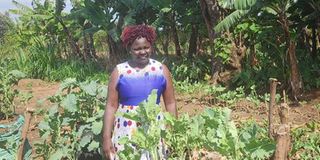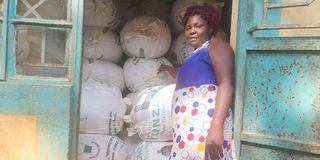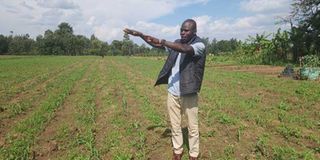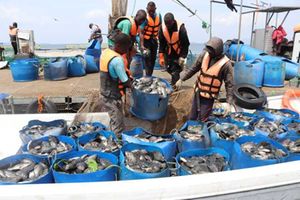
Salome Nanjala, a trained teacher and now a tutor of tutors, at a vegetable demonstration farm in Bungoma.
We walk to Kibunde village agrovet in Bungoma County and find Salome Nanjala preparing notes for group training the following day.
Once in a while, she pauses what she is doing to attend to clients. Since it is the planting season, farmers are here for consultations or to buy maize seeds.
The agrovet is at the centre of the village.
Done with training preparations and attending to clients, Salome is ready to talk to Seeds of Gold.
She is eager to tell the story of the one-stop shop making a difference. Local farmers no longer travel long distances in search of services. The idea did not start today, as Nanjala – a trained teacher – says. Until 2020, she taught at a private primary school.
“I made the decision to get into farming and used my savings to lease an acre to grow maize,” she says.
She only harvested six bags, and not the 17 she had targeted. It was the same story the following season. Nanjala put a lot of effort into maize growing but there was little to show for it.
The farmer had joined a women’s group where she would seek financial support and pay after harvest. The little output made that almost impossible.

Salome Nanjala poses for a photo on April 9, 2025 at one of the maize stores owned by a farmers group in Bungoma County.
In 2020, the group was among the 500 farmers invited for training by West Kenya Machinery Ring (MR) – a German-Sponsored agency that promotes mechanisation. It advocates for minimum tillage, a practice that causes little disturbance to the soil.
The farmers were introduced to chisel ploughs. Like others, Nanjala was not comfortable with the idea. Sensing that, MR offered to train them on demonstration farms.
“I used the new technology to grow soya the same year,” she says, adding that the harvest was good.
Nanjala was invited for training on using limited resources to get maximum harvests. One of the tasks she was given was to bring together farmers in groups of 10 and organise to have their lands chisel ploughed ahead of planting.
“I brought aggregated 56 acres for different farmers. Our biggest secret is group ploughing as it minimises the cost of preparing land,” Nanjala says.
Unlike the disc plough that charges Sh4,500 per acre, every farmer parted with just Sh3,000.
At the end of the season, however, harvests were low. The farmer, who also doubles up as a trainer of trainers (ToT) at Kibingei MR, says they went back to the drawing board.
She says it was evident that the farmers knew little about soil health. They would use inputs without knowing how much to apply.
“Through support from MR, we started testing farmers’ soils. We visited farms and got samples for testing for a fee,” Nanjala says.
Fellow trainer, Eugene Wafula, says farmers could not interpret soil testing results in the beginning. They therefore had to visit every group member to interpret the results and provide advice on what the farmer can do to improve his or her soil health.
“The group membership kept growing and we could no longer visit every farmer. That is how the one-stop shop idea came up,” Wafula says.

Mr Eugene Wafula, a trainer of trainers, poses for a photo at one of their demonstration farms in Bungoma County.
With the help of West Kenya MR, they set up an agrovet to serve farmers in Kibingei, Kimilili Sub-County. The agrovet offers ploughing, planting, weeding, pest eradication, harvesting and post-harvest services and farm implements.
Wafula, who is the Kibingei MR chairperson, says services are based on the season. This allows the stocking of the required inputs and implements, which are sold at subsidised fees.
Kibingei MR now boasts of three farmer groups with more than 100 members each.
“A farmer in every group offers land to be used for demonstration every season,” Wafula says, adding that training is weekly.
“Kibunde village farmer group has three acres used for demonstration. We have divided the farm into sections for vegetables and maize.”
Follow-ups ensure farmers implement what they have learnt. After every harvest, farmers are given training on crop rotation.
“We have 400 bags of maize in stores, which will be sold once we get a good buyer. We hope to use the returns to build a larger store,” Nanjala says. “The demand for our services has far outstripped supply.”
Chris Onyango, the Western Kenya MR project manager, says the organisation applies the self-help business model targeting smallholder farmers.
MR operates in Kimilili and Tongaren sub-counties and will soon be in Kisumu and Siaya counties.







